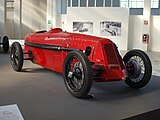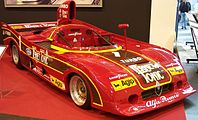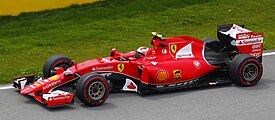Rosso corsa
You can help expand this article with text translated from the corresponding article in Italian. (March 2023) Click [show] for important translation instructions.
|
| Rosso corsa | |
|---|---|
 1938 Alfa Romeo 8C 2900 MM | |
| Common connotations | |
| Italian motor racing, Ferrari | |
| Hex triplet | #D40000 |
| sRGBB (r, g, b) | (212, 0, 0) |
| HSV (h, s, v) | (0°, 100%, 83%) |
| CIELChuv (L, C, h) | (44, 149, 12°) |
| Source | ColorHexa[1] |
| ISCC–NBS descriptor | Vivid red |
| B: Normalized to [0–255] (byte) | |
Rosso corsa is the red international motor racing colour of cars entered by teams from Italy.[2]
Since the 1920s Italian race cars of Alfa Romeo, Maserati, Lancia, and later Ferrari and Abarth have been painted in rosso corsa ("racing red"). This was the customary national racing colour of Italy as recommended between the world wars by the organisations that later became the FIA. In that scheme of international auto racing colours, German cars were white or silver (Silver Arrows), French cars were blue (Bleu de France), British cars were green (British racing green), etc.
History
[edit]In the Peking to Paris race of 1907, the first to arrive in Paris was Prince Scipione Borghese, an Italian aristocrat. He was accompanied by Luigi Barzini, a journalist who worked for The Daily Telegraph, and a valet, Ettore Guizzardi, who acted as his mechanic and traveled with a supply of Lanson champagne. The prince was so confident of winning that he took a detour of several hundred miles from Moscow to St Petersburg for a dinner in honour of the team, and afterwards headed back to Moscow and rejoined the race. Their chief rival was Charles Goddard, a fairground worker and con artist who, until he learned of the race from a scrap of newspaper he found blowing in the wind, had never sat in a motor car and was arrested for fraud as he approached the finish line.
Goddard, who came second, lacked the resources of Borghese and had to beg fellow competitors for fuel. In a desperate attempt to catch up, he set an endurance record for non-stop driving for 24 hours. The prince's prize was simply a magnum of Mumm champagne, and the red colour of his 1907 Itala car was adopted by Italy as its racing colour in his honour.[3][4]
In Formula One, the colour was not determined by the country the car was made in nor by the nationality of the driver(s) but by the nationality of the team entering the vehicle. E.g. the Ferrari works team has always kept a red colour in the tradition of rosso corsa, the national racing colour of Italy, except for last two races in the 1964 season (the 1964 United States Grand Prix and 1964 Mexican Grand Prix) when Enzo Ferrari let his cars be entered by the NART team in American national racing colours (white with blue lengthwise "Cunningham racing stripes") to protest against Italian racing authorities. However, Ferrari cars entered by non-Italian privateer teams wore their respective national racing colours until the 1961 Belgian Grand Prix when Belgian driver Olivier Gendebien privately entered a Ferrari car painted in the Belgian racing yellow colour, scoring 4th behind three other Ferrari cars painted in red as they were entered by the Scuderia Ferrari works team itself, and driven by US drivers Phil Hill and Richie Ginther as well as German Wolfgang von Trips.
Ferrari won the 1964 World championship with John Surtees by competing the last two races (the United States Grand Prix and Mexican Grand Prix) in Ferrari 158 cars painted white with blue lengthwise "Cunningham racing stripes" -the national colours of the teams licensed in the United States- as these were entered not by the Italian factory themselves but by the American NART team. This was done as a protest against the agreement between Ferrari and the Italian Racing Authorities regarding their planned mid-engined Ferrari race car. Since Ferrari cars entered in 1965 and 1969 seasons by the NART team and at the 1966 Italian Grand Prix by the British privateer Reg Parnell team kept wearing the red colour, the 1964 Mexican Grand Prix was the last time Ferrari cars wore other than the traditional red colour in Formula One.
National colours were mostly replaced in Formula One by commercial sponsor liveries in 1968, but unlike most other teams, Ferrari always kept the traditional red but the shade of the colour varies.[5] From 1996 to 2007 Ferrari F1 cars were painted in a brighter, almost orange day-glo to adjust for colour balance on television screens. The original Rosso Corsa may appear almost dark brown in older television sets. The Rosso corsa shade of red made a return on the F1 cars at the 2007 Monaco Grand Prix, possibly in line with the increasing market presence of higher quality high definition television.
Italian motorcycle company Ducati also features this color as one of their main colors both in its racing motorcycles such as the Ducati Desmosedici[6] and in its road bikes such as the Ducati Panigale V2.[7]
Red cars are also traditional in Alfa Romeo and Ferrari car running in other motorsport championships, such as Supertouring championships in the former and the 24 Hours of Le Mans and 24 Hours of Daytona in the latter. In contrast, since the 2000s Maserati has been using white and blue and Abarth has been using white with red flashes. Rosso Corsa is also an extremely popular colour choice for Ferrari road cars, nearly 80% of all Ferraris sold are in the colour.
Gallery
[edit]-
1925 Itala Tipo 11
-
Ferrari SF15-T, fielded in the 2015 Formula One season
-
Ferrari Supercars at the Quail
-
Palm One Ferrari 360 Challenge Stradale
-
Ferrari California, the first Ferrari to feature a metal-folding roof.
-
Ducati Desmosedici GP8, fielded in the 2008 MotoGP season
See also
[edit]Notes
[edit]- ^ "Rosso corsa / #d40000 hex color". ColorHexa. Retrieved 2022-08-25.
- ^ Bristow 2013, p. 7.
- ^ Copping 2007.
- ^ St. Clair 2016.
- ^ motorlat (2017-11-14). "The evolution of Scuderia Ferrari's Marlboro in F1". motorlat.com. Retrieved 2022-08-27.
- ^ "MotoGP, Ducati cambia Rosso: l'analisi di Alex Design". Corsedimoto (in Italian). 2022-01-31. Retrieved 2022-08-20.
- ^ "Ducati Panigale V2: High Performance, Red Essence | Ducati". www.ducati.com. Retrieved 2022-08-20.
References
[edit]- Bristow, Grahame (2013). Restoring Sprites and Midgets. M-Y Books Distribution. ISBN 9781783180189.
- Copping, Jasper (27 May 2007). "Beijing to Paris motor race back on course". The Daily Telegraph. Retrieved 2013-11-26.
- St. Clair, Kassia (2016). The Secret Lives of Colour. London: John Murray. p. 148–149. ISBN 9781473630819. OCLC 936144129.
Further reading
[edit]- Ludvigsen, Karl (2008). Italian Racing Red: Drivers, Cars and Triumphs of Italian Motor Racing Racing Colours. Ian Allan Publishers. ISBN 9780711033313.









